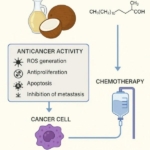
by Paul Fassa
Health Impact News
A very recent review on nutritional approaches toward preventing and reversing Alzheimer’s disease (AD) was conducted in Christchurch, New Zealand’s Canterbury University. The results were submitted to the journal Nutrition.
It’s title: The ketogenic diet as a potential treatment and prevention strategy for Alzheimer’s disease.
The University of Canterbury Researchers’ Review Approach
A review study examines several other studies doing research on a particular topic including lab culture studies or animal and human studies. The review analyzes shortcomings, brings out highlights, and combines proven aspects to formulate its own conclusions.
In this review study on the effects of the ketogenic diet on Alzheimer’s, the researchers expressed their concerned awareness of the failed pharmaceutical approaches of curbing the rise of Alzheimer’s disease (AD).
See:
New Alzheimer’s Drugs Continue to Fail Where Coconut Oil Shines
So the Canterbury University researchers decided to review several studies of dietary interventions for AD.
The ketogenic diet involves healthy animal and plant fat consumption with moderate protein intake and vastly lowered carbohydrate consumption. It produces ketones, another source of energy, to replace glucose necessity when insulin resistance blocks glucose from fueling cells, a feature of diabetes 2.
The 33 studies they reviewed were not all strictly ketogenic diet (KD) studies applied to AD. Some were variations of low-carb diets such as the Atkins diet. And some of the ketogenic (high-fat, low-carbohydrate, moderate protein) diets were used to successfully treat epileptics.
Some of the 33 studies researched the effects of medium chain triglycerides (MCTs). Coconut oil is the best source of MCTs to provide another energy source, ketone bodies (KBs) to a brain in which glucose metabolism is impaired due to insulin resistance. The MCTs are easily converted to KBs in the liver.
The New Zealand researchers focused on common aspects discovered through the 33 studies to further understand the mechanics of AD and to formulate an effective dietary intervention needed for AD.
They brushed aside the widely accepted “cause” of AD, amyloid plaques and neurofibrillary tangles, by implying a more basic underlying cause.
Research has begun to identify early underlying mechanisms in Alzheimer’s disease that could be targeted by new prevention strategies. *Glycation of the ApoE protein* leads to impaired transportation of important lipids, including cholesterol, to the brain, resulting in lipid deficiencies that could explain progression to the later pathologies of the disease.
[*Glycation is a process where proteins or their amino acids, certain fats, and glucose tangle together. It hardens or stiffens body tissues of the organs affected, including arteries, making them stiff and inflexible.
*Apolipoprotein E (ApoE) is a major cholesterol carrier that supports lipid transport and injury repair in the brain. APOE polymorphic alleles are the main genetic determinants of Alzheimer disease (AD) risk. Source ]
What was emphasized in the study quoted above is worthy of closer scrutiny. The researchers mentioned the importance of sufficient cholesterol in the brain as well.
One out of 5 Americans over the age of 55 are currently prescribed statin drugs.
And what do statin drugs do? They lower cholesterol, which could lead to increase in incidents of Alzheimer’s and other neurological disease risks.
Also see:
The Grave Dangers of Statin Drugs—and the Surprising Benefits of Cholesterol
This Review Study Recommends a Totally Nutritional Approach
Regardless of whether or not cause has been established, enough has been discovered of AD’s features to research dietary approaches to its prevention and healing.
Those features do involve amyloid plaques.
But they have also been discovered in the brains of those who died with normal memory and reasoning resources – not a solid mark for the amyloid plaque-causes-AD crowd.
The authors of this review study stated its nutritional premise in the introduction:
…further evidence now points toward neurometabolic issues as a potential underlying cause of both the plaques and tangles and the ultimate progression of AD.
To address these metabolic issues, research has explored dietary interventions, including the high-fat, low-carbohydrate ketogenic diet (KD). The KD could potentially target these metabolic issues while also protecting against the Ab plaques associated with AD. [Emphasis added]
Those metabolic issues are the same issues of diabetes type 2, which has led some to label AD as diabetes type 3. From the review study’s text:
Impaired glucose metabolism in the brain may be one of the earliest hallmarks of AD; studies investigating young adults with a high genetic risk for AD have found that these metabolic deficits could be present as early as young adulthood, decades before the onset of dementia.
This early impairment in glucose metabolism implies that metabolic interventions could be effective in preventing or at least inhibiting the development of the disease.
It has been proposed that ketone bodies, which are produced when adhering to a KD, could be used to provide a supplementary energy supply for the brain, increasing mitochondrial efficiency and cognitive function.
Evidence suggests that brain ketone uptake is not impaired in AD in the way that glucose uptake is, making it a viable alternative energy precursor. This supplementary brain metabolism is the first mechanism through which the KD has been proposed to help in the treatment and prevention of AD.
The review researchers point out that creating ketones from medium chain triglyceride (MCTs), sources found most richly in coconut oil, creates an all-around energy source that nurtures brain health.
But in their opinion, further nutritional activity is needed to restore brain health completely.
That main nutritional activity should be reducing or restricting carbohydrates in addition to increasing fat consumption. They firmly supported the ketogenic diet as both preventative for Alzheimer’s disease (AD) and restorative for brain health among AD victims.
Common sense points to avoiding highly processed grains, sugars, and high fructose corn syrup (HFCS) while maintaining a lower carbohydrate intake with whole unrefined foods would qualify as a healthy strategy for restricting carbohydrate consumption.
The review paper brought up the adverse effects from the most highly refined carbohydrates.
High-carbohydrate diets (particularly those rich in fructose or fructose-containing carbohydrates; e.g., sucrose) inhibit the hepatic [liver] production of lipoproteins, which in turn starve neurons of these essential biochemicals, which might result in the neurodegeneration seen in Alzheimer’s disease (adapted from Seneff et al). [Emphasis added]
As a reminder, lipoproteins are the cholesterol carriers in the blood that deliver cholesterol to areas of the body where needed for health. Cholesterol is not our enemy. See how many vital functions it supports in our bodies here:
The Cholesterol Myth – We Need Cholesterol
The Canterbury University study’s paper expressed public health concerns regarding commercial foods that tend to spike energy while depriving cellular nutrition, leading to metabolic dysfunctions that promote chronic diseases such as dementia.
The potential efficacy of preventative measures also should be assessed. If the underlying cause of AD is related to lifestyle factors such as diet, with genetic factors exacerbating this in some cases, changes in modern dietary norms may reduce the prevalence of AD in the future.
Fructose, for example, produces AGEs* at up to 10 times the amounts caused by glucose interestingly, fructose is present in many popular sweetened beverages and processed foods owing to the widespread use of high-fructose corn syrup by the food industry. [Emphasis added]
*AGEs is the acronym for Advanced Glycation End products, toxic spoils of mangled proteins found among AD patients’ spinal fluids in large amounts. They are formed when sugars abnormally combine with certain amino acids or fats, usually due to high blood sugar.
A danger of AGEs is that they can clog the very small blood vessels or capillaries of the microvascular system throughout the body’s organs, especially kidneys, eyes, heart, and brain, contributing to various prediabetic or diabetic complications.
It’s apparent the majority of chronic disease issues stem from excess refined carbohydrate consumption, which is the essence of the standard American diet (SAD).
After analyzing 33 studies researching AD and other neurological disorders handled with a ketogenic diet and supplementing coconut oil, the University of Canterbury review analysis concluded:
In this review, we hypothesize that the ketogenic diet could be an effective treatment and prevention for Alzheimer’s disease, but both ketone production and carbohydrate restriction may be needed to achieve this.
Adding coconut oil and embracing a high-fat ketogenic diet with lower carb consumption is a safe dietary solution for the damage to the body created by our SAD eating habits.
Comment on the article at HealthImpactNews.com.
Virgin Coconut Oil:
How it has changed people’s lives and how it can change yours!
Includes 85 recipes – Free shipping available!






 HHS Secretary Kennedy Breaks His Promise: "War on Saturated Fat" Kept in Tact with New U.S. Dietary Guidelines
HHS Secretary Kennedy Breaks His Promise: "War on Saturated Fat" Kept in Tact with New U.S. Dietary Guidelines Research Continues to Show Virgin Coconut Oil's Effectiveness in Treating Cancer
Research Continues to Show Virgin Coconut Oil's Effectiveness in Treating Cancer Coconut Oil Continues to Benefit Alzheimer's Patients over Drugs as Studies Continue for Neurological Benefits
Coconut Oil Continues to Benefit Alzheimer's Patients over Drugs as Studies Continue for Neurological Benefits How the Simple High-Fat Low-Carb Ketogenic Diet Continues to Change People's Lives
How the Simple High-Fat Low-Carb Ketogenic Diet Continues to Change People's Lives New Studies Continue to Show that Coconut Oil is the Best Oil for Treating Skin Conditions and Maintaining Healthy Skin and Teeth
New Studies Continue to Show that Coconut Oil is the Best Oil for Treating Skin Conditions and Maintaining Healthy Skin and Teeth